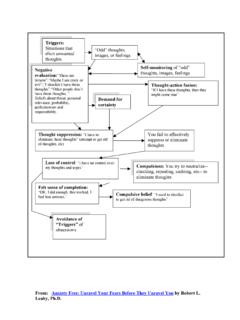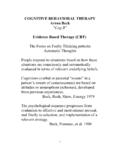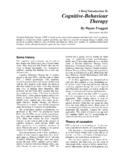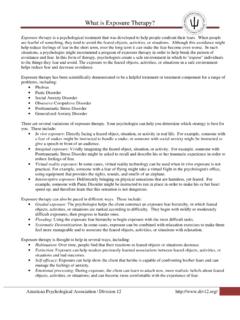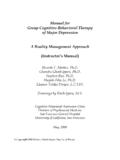Transcription of AMERICAN NSTITUTE FOR COGNITIVE THERAPY
1 A MERICAN I NSTITUTE FOR C OGNITIVE T HERAPY. 136 East 57th Street Phone: 212-308-2440. Suite 1101 Fax: 212-308-3099. New York, NY 10022 W EEKEND W ORKSHOPS. 1. Back from the Brink: Using CBT to Help Suicidal Clients to Choose to Live Workshop Leader: Cory F. Newman, , ABPP, Center for COGNITIVE THERAPY in Philadelphia, PA, University of Pennsylvania, Perelman School of Medicine Date: Saturday, January 26, 2013 Time: 10AM-4PM. Fee: $225 for Professionals; $175 for Students (with a copy of your current Student ID). This workshop focuses on helping therapists utilize best practices in COGNITIVE -behavioral THERAPY to safely and effectively manage and treat suicidal clients.
2 Emphasis will be given to the careful building of a collaborative therapeutic relationship with suicidal clients, as well as helping practitioners to: 1. Understand the maladaptive thinking processes characteristic of suicidal clients 2. Assess the level of risk, both during and between acute crises 3. Conceptualize the suicidal behaviors of clients 4. Devise an array of interventions in order to reduce the clients' sense of helplessness and hopeless- ness and to increase their self-efficacy and capacity for joy 5. Compose anti-suicide safety plans 6. Meet the standards of care that are necessary to minimize legal liability 7.
3 Utilize self-help skills to cope with treating suicidal clients and to maintain optimal perspective and judgment during times of duress Special emphasis will be placed on COGNITIVE -behavioral interventions such as problem-solving, increasing attachments to people and activities, and modifying suicidogenic beliefs. These procedures will be linked to research on the COGNITIVE characteristics of suicidal clients, including hopelessness, morbid perfectionism, dichotomous thinking, poor autobiographical recall, and time perception distortions. In addition, this workshop will touch upon the oft-neglected topic of how therapists respond in the aftermath of a client's completed suicide.
4 Course Objectives: 1) Assess the COGNITIVE vulnerability factors that alert the clinician to the client's level of risk for suicide. 2) Utilize risk management methods that represent the standard of care in the treatment of suicidal clients. 3) Apply specific COGNITIVE -behavioral techniques and homework assignments in the treatment of suicidal cli- ents, in the context of a collaborative therapeutic relationship and an accurate COGNITIVE -behavioral case conceptualization. 4) Apply self-help skills to cope with the stress of treating clients who are suicidal, and to maintain profession- al confidence and optimism for the future even in the aftermath of losing a client to suicide.
5 2. How to Use COGNITIVE THERAPY to Help People with Cancer Workshop Leaders: Tomer Levin, , & Allison Applebaum, , Memorial Sloan-Kettering Cancer Center Date: Saturday, February 2, 2013 Time: 10AM-4PM. Fee: $225 for Professionals; $175 for Students (with a copy of your current Student ID). One in three people will develop cancer. This means that COGNITIVE therapists must have the skills and confidence to help these people in their psychotherapy practices. Working with cancer patients at all stag- es of their disease can be a challenging, but COGNITIVE THERAPY (CT) is very effective in helping them to cope with the cancer diagnosis, treatment, and re-adapting to life.
6 This workshop will give clinicians the tools they need to feel confident in their work with patients with cancer: 1. How the principles of CT can be adapted to psycho-oncology 2. What works: specific CT techniques that help guide patients through the cancer trajectory, from understanding prog- nosis, to self-injecting, to making better decisions, to MRI claustrophobia and conditioned nausea. 3. Depression, anxiety and mixed depression-anxiety. What are the best approaches? Can anxiety be eliminated? Learn how to integrate psychopharmacology as a CT tool. 4. The fear of death is always present. CT techniques are particularly helpful and can turn life fearing into life affirming.
7 5. The tyranny of positive thinking (Steve Jobs, former CEO of Apple, should have consulted with a COGNITIVE therapist). 6. Using your own experiences with cancer, illness and death to help and motivate and fortify your patients This workshop is taught by two experienced COGNITIVE therapists and psycho-oncology researchers from Memorial Sloan Kettering Cancer Center. They bring their expertise via engaging didactics and discussions. Role-plays are used to build your skills and compe- tency in dealing with typical psycho-oncology challenges. Participants are encouraged to bring cases or material from personal expe- riences with cancer for discussion with the group.
8 By the end of this workshop you will feel confident in your ability to apply cogni- tive THERAPY to help your patients with cancer. 3. COGNITIVE Behavioral Treatment for Complicated Grief Following Bereavement Workshop Leader: Anthony D. Mancini, , Pace University Date: Saturday, February 16, 2013 Time: 10AM-4PM. Fee: $225 for Professionals; $175 for Students (with a copy of your current Student ID). Complicated grief (CG) is a syndrome of persistent and painful yearning, feelings of emptiness, intrusive thoughts, anger or guilt, and avoidance of reminders related to the deceased. CG afflicts approximately 10-20% of bereaved persons, causing substantial distress, health problems, increased risk of mortality, and impairments in everyday func- tioning.
9 Although treatments for grief have historically been controversial, recent treatment models have proven efficacious. Based on COGNITIVE behavioral principles, these newer treatment models employ exposure and COGNITIVE restructuring techniques to help the griever accommodate the reality of the loss, tolerate distressing reminders, con- front avoidance of people, places, and things, and develop new ways of thinking about the deceased and the experi- ence of loss. Applied with sensitivity to the griever's unique experience, these techniques can substantially reduce distress, promote better role functioning, and help the person achieve new goals in life.
10 The workshop will begin by delineating the symptoms of grief and indications for a grief-focused treatment. A brief review of recent empirical research on grief treatments and risk factors for complicated grief will follow. Participants will then receive an introduction to basic exposure and COGNITIVE restructuring techniques followed by a detailed description of their specific application to CG. Partici- pants will learn how to provide psycho-education as a means of promoting treatment engagement, to develop a CG case formulation that will play a key role in treatment, and to skillfully apply specific CBT techniques with proven efficacy.
